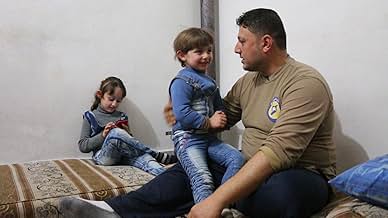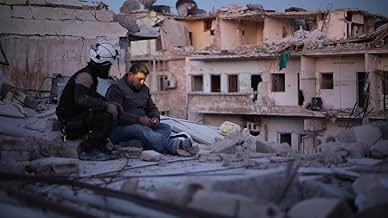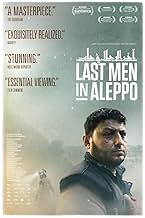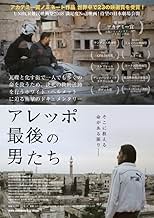NOTE IMDb
7,4/10
3,1 k
MA NOTE
Ajouter une intrigue dans votre langueKhaled, Mahmoud and Subhi volunteer with the White Helmets trying to save lives of hundreds of victims in the besieged city of Aleppo during the Syrian Civil War.Khaled, Mahmoud and Subhi volunteer with the White Helmets trying to save lives of hundreds of victims in the besieged city of Aleppo during the Syrian Civil War.Khaled, Mahmoud and Subhi volunteer with the White Helmets trying to save lives of hundreds of victims in the besieged city of Aleppo during the Syrian Civil War.
- Réalisation
- Scénario
- Casting principal
- Nommé pour 1 Oscar
- 26 victoires et 17 nominations au total
Mahmoud Alheter
- Self - volunteer rescue worker
- (as Mahmoud)
Avis à la une
Full review on my blog max4movies: De sidste mænd i Aleppo (international title: Last Men in Aleppo) is a documentary about the White Helmets, a voluntary nonprofessional organization in Syria that has been helping people after bomb attacks since the civil war started in 2013. The documentary features footage that was shot between 2013 and 2017 and mostly focuses on three young men and their dilemma whether to stay or leave Aleppo. There is few information provided and no additional material was used (like interviews or external media coverage), which is why the documentary feels authentic but also raw. The conflict in Syria is a contemporary geopolitical crisis and, thus, the documentary is topical, important, and although few scenes actually contain graphic violence or gore, the catastrophe feels personal and heart-breaking. Although there are some technical drawbacks (e.g., structure and editing), the subject matter is simply too important to disregard.
If you like to watch dead children and assorted body parts being recovered from rubble, boy, do I have the movie for you! As you might imagine this is a very hard documentary to watch, especially the beginning as you get used to watching horror after horror that is the everyday life of these people living in Aleppo, during the Syrian civil war. The movie follows the lives of some of the White Helmets, an organization that was founded to help people in need during wartime and has been subject to a lot of conflicting information, some even claiming them to be terrorists, although every piece of evidence points to them just being a mostly humanitarian organization. As for the movie it is extremely well made, and the directors have a very cinematic approach both to shooting and to editing making it look just as good as any war movie blockbuster. And that helps it hit even harder when all the horrible imagery starts showing. My one complaint about the movie is that the middle part drags a little as it gets a bit tiring watching rubble after rubble, but it was necessary to show how these people lived and makes the final gut wrenching moment a bit more poignant. That ending puts the film into a new perspective and offers little to no hope about the subject. It is a wonder how they managed to make this movie and capture these unfortunate events on camera.
"There is nothing intelligent to say about a massacre. Everybody is supposed to be dead, to never say anything or want anything ever again. Everything is supposed to be very quiet after a massacre, and it always is, except for the birds. And what do the birds say? All there is to say about a massacre, things like 'Poo-tee-weet?'" Kurt Vonnegut, Slaughterhouse-Five
Call it what you will, Syria's President Assad's pummeling his people with the aid of Russian bombers is genocide plain and simple. You do not want to see the blunt documentary Last Men in Aleppo if you support Assad or can't stomach The White Helmets pulling dead babies from rubble.
What you will see, however, is a first-rate rendering from the streets of Helmet heroic citizens risking their lives to save the victims of the destruction. The doc concentrates on Khaled Omar, a founder of the Helmets, looking for people to save all the time staying in contact through cell with his family. On occasion he plays with the kids at an oasis of a playground.
Therein lies the supreme irony of people trying to survive holocaust and trying to retain the dignities of normal life. As one Helmet says, "Should we sit down and cry or what?" Actually only the words of the survivors can get even close to understanding genocide in our own time, 250,000 Syrians dead since the purge began in 2011.
Although Khaled and his crew save adults as well, the children are the starkest notion of cruelty on a mass basis and the loss of future for everyone, as Khaled says profoundly and prophetically, "The dilemma is the children." Despite the discursive narration and exposition that seem to randomly course among the ruins, the cumulative effect of sorrow and brief joy is to give us an unforgettable documentary experience, even if we go back to our democratic safety zones, creating a few potholes on an airstrip while the city burns.
"The horror! The horror!" Joseph Conrad's Kurtz in Heart of Darkness
Call it what you will, Syria's President Assad's pummeling his people with the aid of Russian bombers is genocide plain and simple. You do not want to see the blunt documentary Last Men in Aleppo if you support Assad or can't stomach The White Helmets pulling dead babies from rubble.
What you will see, however, is a first-rate rendering from the streets of Helmet heroic citizens risking their lives to save the victims of the destruction. The doc concentrates on Khaled Omar, a founder of the Helmets, looking for people to save all the time staying in contact through cell with his family. On occasion he plays with the kids at an oasis of a playground.
Therein lies the supreme irony of people trying to survive holocaust and trying to retain the dignities of normal life. As one Helmet says, "Should we sit down and cry or what?" Actually only the words of the survivors can get even close to understanding genocide in our own time, 250,000 Syrians dead since the purge began in 2011.
Although Khaled and his crew save adults as well, the children are the starkest notion of cruelty on a mass basis and the loss of future for everyone, as Khaled says profoundly and prophetically, "The dilemma is the children." Despite the discursive narration and exposition that seem to randomly course among the ruins, the cumulative effect of sorrow and brief joy is to give us an unforgettable documentary experience, even if we go back to our democratic safety zones, creating a few potholes on an airstrip while the city burns.
"The horror! The horror!" Joseph Conrad's Kurtz in Heart of Darkness
Not all movies are fun, and this one sure isn't. But that doesn't mean it isn't a good movie.
The emotions raised in this movie are one's of disgust and sympathy. Disgust for the actions of the Syrian government, and its Russian allies, in bombing the crap out of one of their own cities (Aleppo). The destruction portrayed here is, frankly unimaginable, as you see the bombs being dropped on a city that probably has more bombed out homes and apartments than livable ones. How, you can't help but ask, can a government do that to its own people? Is there really any justification for this kind of behavior?
There aren't many reviews in IMDB for this movie, but one of them is from a Syrian government sympathizer who claims that the images and story presented here are nothing but anti-government propaganda. Well, if that is what it is, then they have gone to incredible lengths to create an alternative, fictional universe and the filmmakers deserve awards not for documentary feature, but best special effects. I don't know how you could fake many of these scenes.
The sympathy comes from the story that unfolds in this documentary for a small band of dedicated Aleppans (?) called the White Helmets. These people are sort of the equivalent of a fire department, except that fighting fires is probably the smallest part of their job. Mostly they spend days on end digging people, some of them alive, but most of them dead, out from under the collapsed buildings where they used to live. Most of the bodies are those of children and women and the horror of finding unattached limbs is not sugar-coated here. How you ask, can these people continue to live here.
And, an even bigger question is how can these White Helmets do this kind of work day after day? We see one of the men, a leader of one of the brigades, find some small amount of solace in creating a gold-fish pond in his courtyard. His love for his family, and his city, is so strong and, especially at the end, it is difficult not to cry for him.
This is not a feel-good movie - there is no way you can laugh during this movie, nor feel better about the prospects of these people. But it is a powerful and effective documentary that opens your eyes to both what is evil in men, and how much good can be found in those who fight it. I give this 4 stars (out of 5).
The emotions raised in this movie are one's of disgust and sympathy. Disgust for the actions of the Syrian government, and its Russian allies, in bombing the crap out of one of their own cities (Aleppo). The destruction portrayed here is, frankly unimaginable, as you see the bombs being dropped on a city that probably has more bombed out homes and apartments than livable ones. How, you can't help but ask, can a government do that to its own people? Is there really any justification for this kind of behavior?
There aren't many reviews in IMDB for this movie, but one of them is from a Syrian government sympathizer who claims that the images and story presented here are nothing but anti-government propaganda. Well, if that is what it is, then they have gone to incredible lengths to create an alternative, fictional universe and the filmmakers deserve awards not for documentary feature, but best special effects. I don't know how you could fake many of these scenes.
The sympathy comes from the story that unfolds in this documentary for a small band of dedicated Aleppans (?) called the White Helmets. These people are sort of the equivalent of a fire department, except that fighting fires is probably the smallest part of their job. Mostly they spend days on end digging people, some of them alive, but most of them dead, out from under the collapsed buildings where they used to live. Most of the bodies are those of children and women and the horror of finding unattached limbs is not sugar-coated here. How you ask, can these people continue to live here.
And, an even bigger question is how can these White Helmets do this kind of work day after day? We see one of the men, a leader of one of the brigades, find some small amount of solace in creating a gold-fish pond in his courtyard. His love for his family, and his city, is so strong and, especially at the end, it is difficult not to cry for him.
This is not a feel-good movie - there is no way you can laugh during this movie, nor feel better about the prospects of these people. But it is a powerful and effective documentary that opens your eyes to both what is evil in men, and how much good can be found in those who fight it. I give this 4 stars (out of 5).
"Last Men in Aleppo", is a shattering Danish/Syrian documentary about the Syrian Civil War that should leave you in anger and tears after viewing it.
Beginning as a film editor, Syrian writer/director Firas Fayvad previously had made documentaries for television, his most famous being "On the Other Side", the making of which resulted in Fayyad's arrest and torture for nine months between 2011 and 2012. But even that has not achieved the level of international fame "Last Men in Aleppo" has brought him, for it documents the efforts of the White Helmets, an organization consisting of ordinary citizens whose purpose is to save civilians (especially children) who are buried under the rubble from continuous bombings by the Soviet Union unabashedly targeting apartment buildings, hospitals and non-military establishments.
What is so shocking about this film is the way it plants the viewer in the middle of the violence as it is happening, and from the point of view of the heroic rescuers. There are deliberate lulls in the film in which we live in the houses with the families of the White Helmets, but that just makes the inhuman tragedy even more shocking when the violence comes. This is a film impossible to forget once seen.
Beginning as a film editor, Syrian writer/director Firas Fayvad previously had made documentaries for television, his most famous being "On the Other Side", the making of which resulted in Fayyad's arrest and torture for nine months between 2011 and 2012. But even that has not achieved the level of international fame "Last Men in Aleppo" has brought him, for it documents the efforts of the White Helmets, an organization consisting of ordinary citizens whose purpose is to save civilians (especially children) who are buried under the rubble from continuous bombings by the Soviet Union unabashedly targeting apartment buildings, hospitals and non-military establishments.
What is so shocking about this film is the way it plants the viewer in the middle of the violence as it is happening, and from the point of view of the heroic rescuers. There are deliberate lulls in the film in which we live in the houses with the families of the White Helmets, but that just makes the inhuman tragedy even more shocking when the violence comes. This is a film impossible to forget once seen.
Le saviez-vous
- AnecdotesToutes les informations contiennent des spoilers
- ConnexionsFeatured in La 90e cérémonie des Oscars (2018)
Meilleurs choix
Connectez-vous pour évaluer et suivre la liste de favoris afin de recevoir des recommandations personnalisées
- who is the mean Director for last men in Aleppo?
- How long has this film been filmed?
- where the film shot?
Détails
- Date de sortie
- Pays d’origine
- Site officiel
- Langue
- Aussi connu sous le nom de
- Last Men in Aleppo
- Lieux de tournage
- Aleppo, Syria(location)
- Sociétés de production
- Voir plus de crédits d'entreprise sur IMDbPro
Box-office
- Montant brut aux États-Unis et au Canada
- 14 637 $US
- Week-end de sortie aux États-Unis et au Canada
- 1 505 $US
- 7 mai 2017
- Montant brut mondial
- 14 637 $US
Contribuer à cette page
Suggérer une modification ou ajouter du contenu manquant

Lacune principale
By what name was Les derniers hommes d'Alep (2017) officially released in Canada in English?
Répondre



















